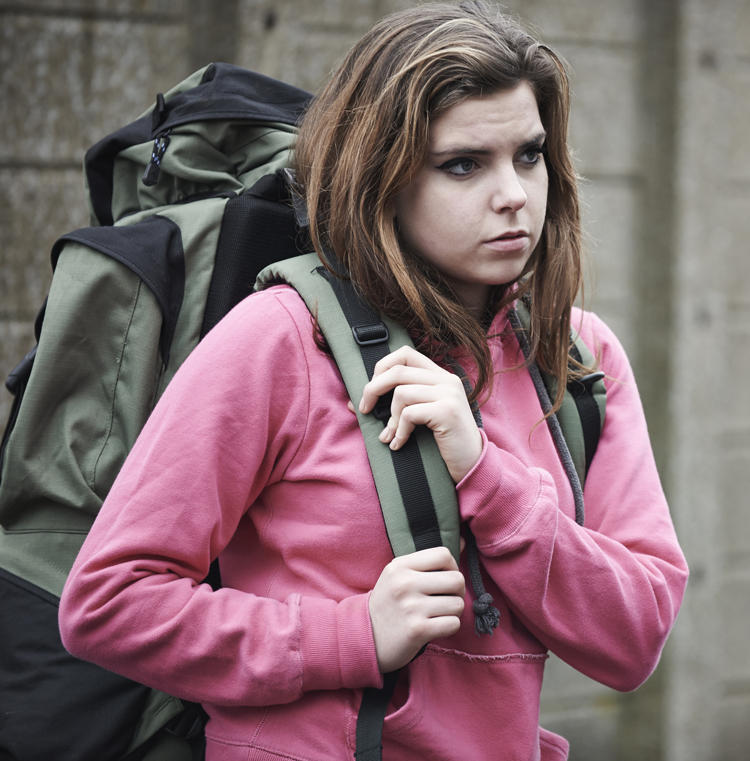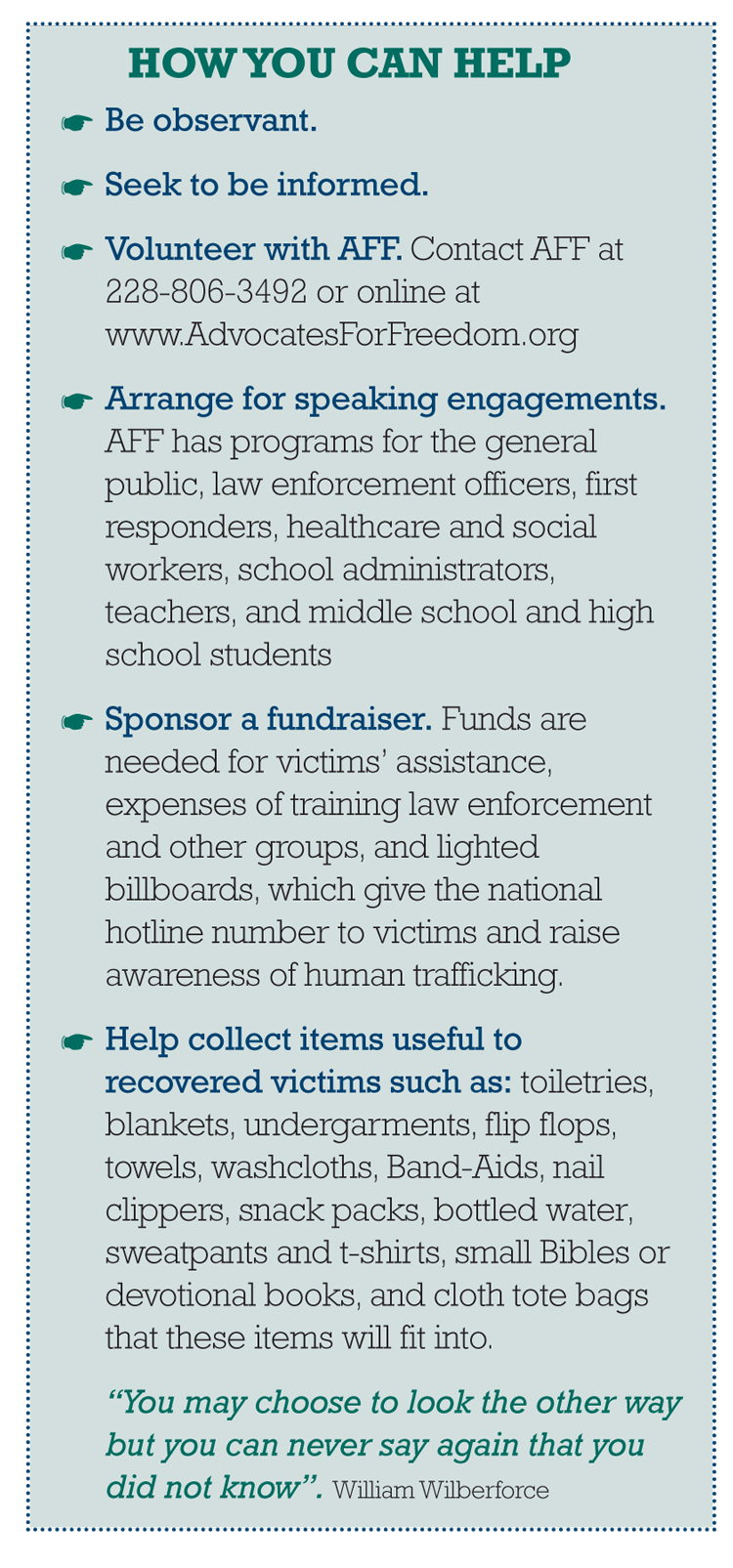By Dora Harbin

What You Need to Know
About Sex Trafficking
Advocates For Freedom (AFF) is a faith-based, non-profit organization dedicated to raising awareness of human trafficking and working with law enforcement and other advocacy groups to offer help to victims.
Human trafficking is the recruitment, harboring, transportation, provision, or obtaining of a person for sex and/or labor trafficking. It is the second largest and the fastest growing criminal enterprise in the world today, second only to drugs. Drugs are consumable. They may be used once and must be replaced. People can be used repeatedly—even up to 20, 30, or more times a day.
Human trafficking is a form of modern-day slavery and exists in two forms:
- Labor trafficking involves working long hours for little or no pay. One example is a restaurant worker who sleeps on the floor with no pillow or blanket. Many times he or she is also a victim of sex trafficking during the night.
- Sex trafficking is forced prostitution
Studies have shown that only 10% of prostitutes are in the business by choice and 90% of those are single women trying to supplement income to feed and clothe their children. A child under 18 is not a “prostitute,” they are prostituted. No 12-year-old girl or boy is going to say, “Today I want to sell myself to thirty men.”
I-10 is the primary interstate in the United States for transporting victims by car, van, or 18-wheeler. Our area is also a hub for human trafficking; I-20 passes through Jackson, which is the hub for sex trafficking in Mississippi. From there it runs to Atlanta, where there is a large concentration of sex trafficking. I-55 comes into Jackson from Memphis, which is another trafficking hub. From Jackson, Hwy 49 goes through Collins, Hattiesburg, and on to the Gulf Coast with victims dropped off along this route. Jackson is a “pick-up point” and also a “throwaway” point, where victims who are no longer in physical condition to be useful to their traffickers are dropped off and abandoned on the streets.
Traffickers use force, fraud, or coercion to control their victims in order to force them to engage in commercial sex acts or other labor or services against their will. Force could be rape, gang rapes, beatings, confinement, or drugs. Fraud may include the promise of a dream job, a safe place to live, or the promise of a better life.
Photos of the victim may be used on the Internet in order to coerce the victim to comply. Any scheme, plan, or pattern intended to cause a person to believe that failure to perform an act would result in serious harm or physical restraint against the victim or their family or the threatened abuse of the legal process is coercion.
Who are the predators? Men, women, husbands, wives, grandfathers, grandmothers, businessmen and women, neighbors, teachers, law enforcement officers, and more—there is no one face of a predator. Someone you see every day could be a predator. Arrests in Canada of a child pornography ring comprised 445 adults including teachers, coaches, doctors, nurses, businesspeople, pastors, and bishops.
Who are the victims? They are men, women, and children of all ages, genders, and races. A victim could be your child’s best friend who is trafficked from home by a parent in exchange for drugs.
Human trafficking is a lucrative business based on the principle of supply and demand. The U.S. Department of Health and Human Services estimates that 100,000 to 300,000 children are prostituted annually. The average age of a child brought into prostitution is 12-14. The average time a victim is trafficked is seven years.
Sex trafficking victims are at risk for drug and alcohol addiction, physical abuse and injuries, traumatic brain injury, sexually transmitted diseases, miscarriages, forced or coerced abortions, and malnutrition. There also psychological risks such as shame, grief, fear, distrust, suicidal thoughts, despair, hopelessness, depression, and self-hatred.
Sex trafficking happens every day but is more frequent wherever there are large groups of people. Sports events, fairs, concerts, Mardi Gras, and school and youth events are some of the arenas targeted by traffickers.
Super Bowl Sunday is the biggest day of the year for trafficking of children. In 2013, two Mississippi boys aged 10 and 11 were taken by a family friend to New Orleans on Super Bowl weekend. They were excited about their first trip without their parents and looking forward to going to the zoo, the aquarium, and spending the night in a hotel. Excitement turned to fear when they were sold to men from Australia with video equipment. They were raped and abused throughout the night while being filmed for Internet pornography.
Thankfully FBI and local law enforcement were out in force and these two boys, as well as other children, were rescued. The video equipment and cameras were confiscated and the “family friend” was prosecuted and is now serving 50 years in prison.
A 15-year-old Mississippi girl was forced into a car, drugged, and taken to Meridian where she was sold for sex trafficking. She was rescued after three days and the perpetrator is now serving 50 years. Unfortunately, there are many more in need of rescue.
Some of the signs that a child is being victimized may include evidence of being controlled, bruises, cuts, scars, or other signs of battering, fear, depression, not making eye contact, or being accompanied by someone who speaks for them.
What do you do if you see something suspicious? Call the national hotline number: 888-3737-888 or text the word HELP to BeFree (233733). Give as much information as you can about the location and the person. Your call will be forwarded through to local law enforcement agencies.
Dora Harbin is the Pine Belt Area Director of Advocates For Freedom and can be reached at 601.325.5242.
